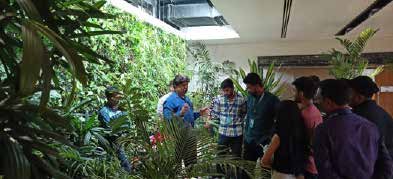ENVIRONMENT
Environment Stewardship
Mindspace REIT relies on natural resources for the construction and management of its properties. To address this, we undertake impact-led initiatives to promote responsible resource usage and sustainable business practices to minimize associated environmental impacts and help generate long-term value. Our energy, water, and waste management policies contribute to our operating efficiency and strengthen our environmental stewardship.
Alignment with UN SDGs
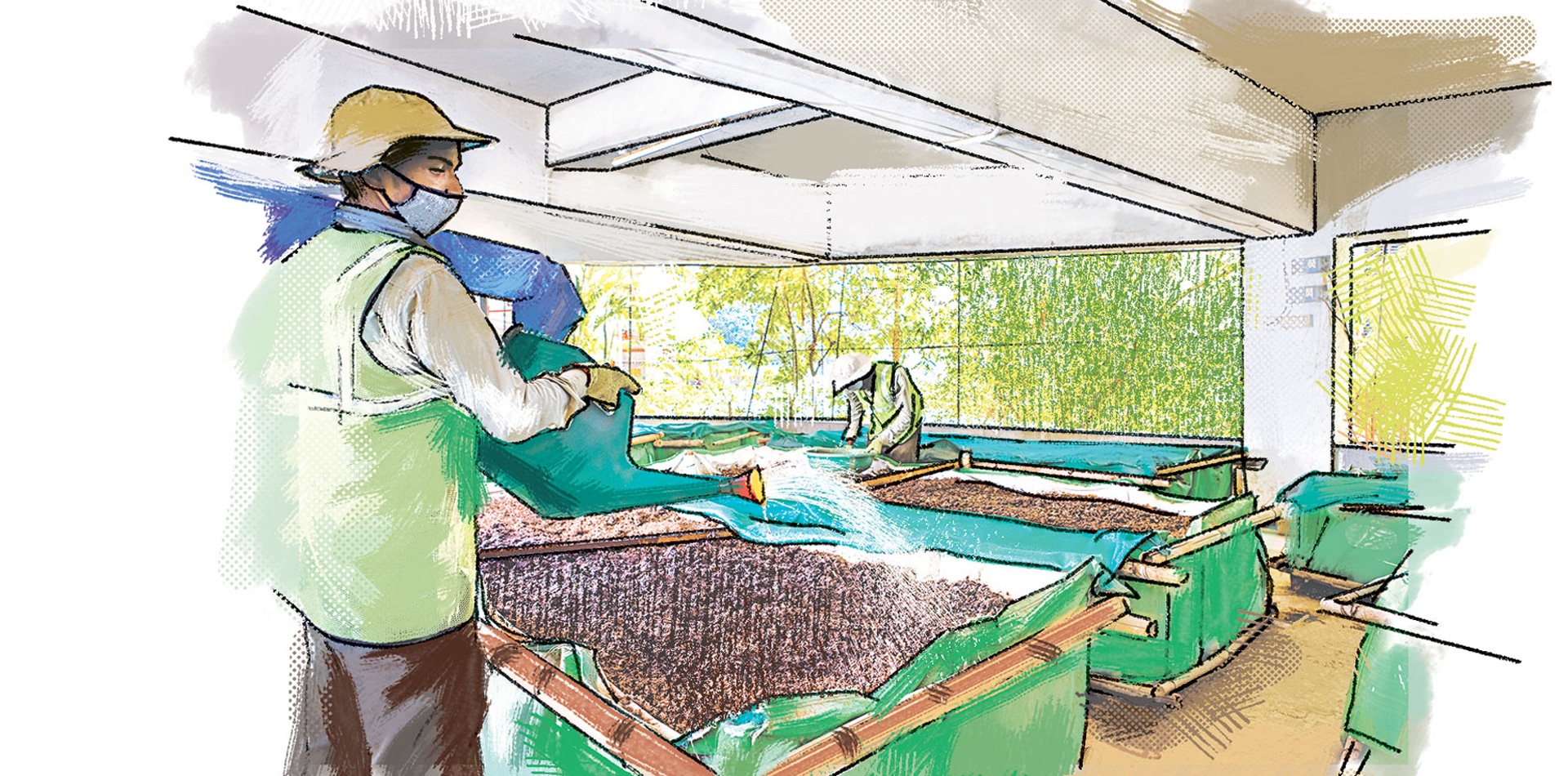

Energy Efficiency
Energy and Emission Performance in FY23
Renewable Energy usage
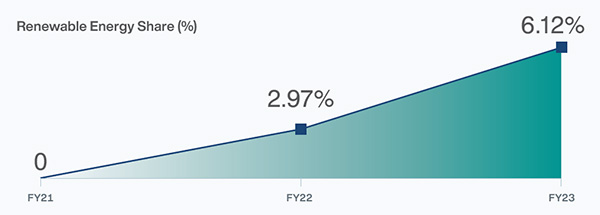
- We have initiated action to enhance the green power foot prints as a commitment to clean power to support decarbonization initiatives and drive our RE100 commitment.
- We have installed systems to generate 1.93 MW of solar power on the rooftop of our buildings. Installing solar power systems has helped reduce electricity bills, increase energy independence by offsetting the amount of electricity that needs to be purchased from the grid, and mitigate greenhouse gas (GHG) emissions and air pollution.
- In total, we generated 1,747.8 MWh of on-site renewable power from April 2022 to March 2023.
- We utilize green energy for common areas across Mindspace Airoli East, Mindspace Airoli West, The Square Avenue BKC 61 and Gera Commerzone, Kharadi. This amounts to 6,370 MWh of Green Power.
- First real estate entity in India to join the global RE100 initiative led by Climate Group in partnership with the Carbon Disclosure Project (CDP).
- We ensure optimal power usage through energy-efficient chillers, pumps and motors, the use of LED lights and fixtures, heat recovery wheels, and Integrated Building Management System for detailed monitoring of power consumption and control of equipment.
Installed systems to generate
1.93 MW
of solar power on the rooftops of our buildings
63,70049 KWh
Renewable Energy Consumed during FY23

Air Quality
- Take steps to reduce the impact of leadbased harmful vapors by utilizing low Volatile Organic Compounds (VOC) paints, materials, and coatings, from the design stage of the building.
- Deployed mechanical air filters of MERV 8 and MER 13 grade across Air Handling Units to ensure the highest quality of indoor air.
- Maintain meticulous records of our CO2 emissions to ensure we are within the air pollution tolerance index limits.
- Integrated UVG lights in AHUs to combat the virus and prevent the spread of infectious diseases.
30 %
extra fresh air as per ASHRAE 62.1

Water and Wastewater Management
- We have optimized our water usage through recycling and reuse of treated water and reduced water wastage.
- We use a certified third party to run quality checks on recycled water.
- Water quality and plant efficiency improved, through enhanced STP technology.
- Before upgrade, recycle percentage efficiency was lower and post upgrade we enhanced efficiency up to 93%.
30 % - 40 %
Potable water saved across green buildings
8,26895 kL
Total Water Recycled during FY23
Case Study
Improving Water Quality Monitoring through On-Site STP Laboratory Analysis
Background
We operate a Sewage Treatment Plant (STP) and efficiently reuse the treated water for secondary purposes such as flushing, HVAC, and horticulture. As a practice, we closely monitor the quality of our treated water.
Our goal is to ensure that the water quality meets acceptable standards and parameters to reduce our dependency on fresh water.
Challenge
Previously, we relied on external laboratories to test our STP-treated water samples, but this often resulted in delays due to third-party dependencies.
Solution
We have established an on-site laboratory to
closely monitor our treated water quality. We
keep accurate and complete records to track the
performance of our STP over time and ensure
compliance with regulatory requirements.
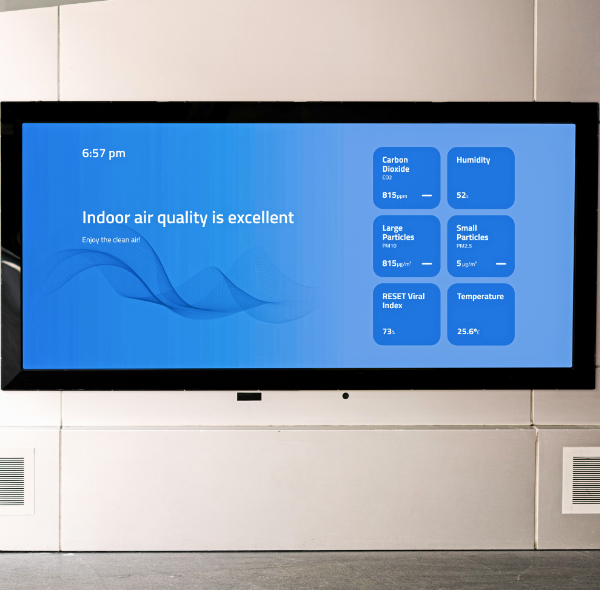
Case Study
New Membrane Bio Reactor (MBR) STP
Challenge
The previous STP plant relied on the Moving Bed Bio Reactor (MBBR) technology and complete manual intervention. Due to the limitation of design and manual operations, and the organizational commitment to environmental concerns to enhance efficiency and treated water quality so the dependency on fresh water will reduce.
Solution
New advanced MBR technology launched at Mindspace Airoli East, Mindspace Airoli West, Paradigm Mindspace Malad and Mindspace Madhapur
Outcomes
- Improved water treatment efficiency
- Better quality of treated water meeting compliance standards
- Optimization of infrastructure and ease of operation
- Built-in redundancy and enhancement of operational efficiency
- Integration of measuring devices and a centralized IBMS platform
- Level 1 service vendors on-boarded with SLA-based performance contract
This initiative ensures round-the-clock water availability and is a key step towards achieving water neutrality and reducing carbon footprint.
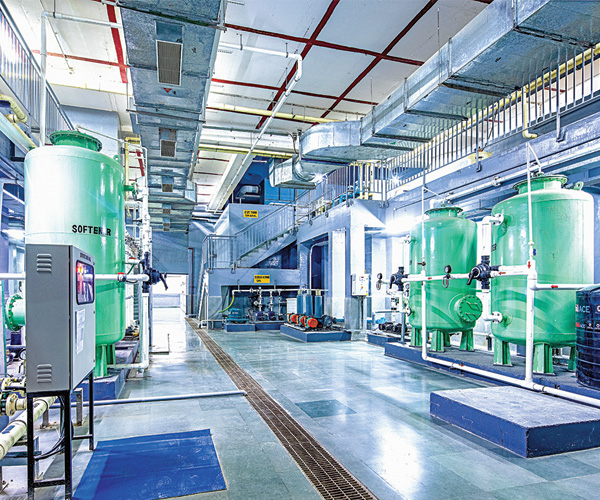
93 %
Operational efficiency of MBR STP

Waste Management
In addition to reducing our contribution to waste, we take active steps to conserve resources and minimize the environmental impact of our construction projects. We endeavor to minimize the amount of waste that ends up in landfills. We do this by focusing on the 3Rs: Reduce, Reuse, and Recycle. Our efficient wet and dry waste management practices also help reduce greenhouse gas emissions.
As part of the integrated sustainable waste management program, we undertake the following interventions at our Business Parks:
- We compost wet waste, convert it to manure, and utilize it for landscaping.
- All waste is assembled at a common place and treated to be converted to manure.
- Reuse of construction waste and debris on site, with the intent to reduce the burden on the city infrastructure.
- Our responsible tenants play their part as partners and assist in the successful implementation of the program.
- We implemented a prohibition on the use of Single Use Plastic (SUP) as part of our commitment to environmental sustainability. To this end, a contractual obligation is being made with partners to reduce the impact of plastic pollution.
- 100% reuse of wet waste.
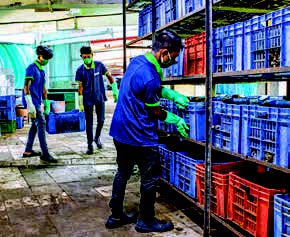
Case Study
IBMS
Installed upgraded Integrated Building Management System (IBMS) in all our buildings to control and monitor a building's essential facilities, including air conditioning, lighting, heating, ventilation, security, and fire protection systems.
An IBMS typically uses sensors, controllers, and communication networks to gather and analyze data from various building systems and devices. This data is then processed, interpreted, and presented to facility managers in real-time to make informed decisions about the building's operations, energy usage, and maintenance needs.
The Infrastructure Monitoring Operational Centre (IMOC) approach is being executed at Mindspace, Airoli East and West.
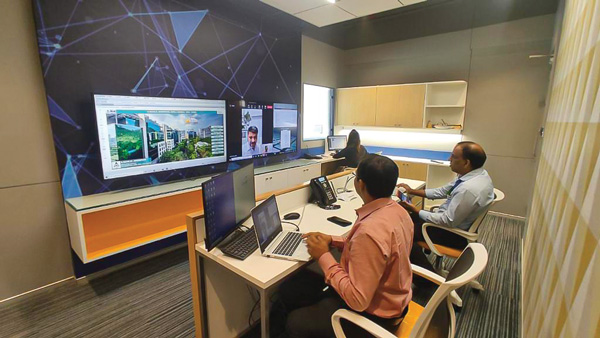
Enhancing Biodiversity
At Mindspace, we have implemented a QR code system to provide instant information about the species of flora across our assets. This is an interactive way for our employees and tenants to learn about the diverse flora.
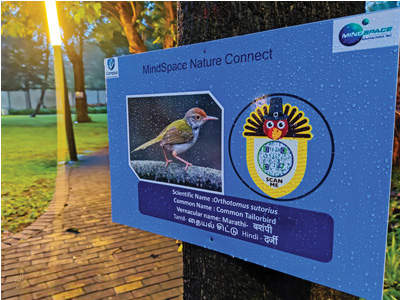

Green Building Certifications
We have successfully achieved WELL Health-Safety Rating for 41 buildings across our portfolio. To receive this recognition, a commercial building must meet certain criteria and standards that ensure the health, safety, and well-being of its occupants. In the wake of COVID-19, the certification has become increasingly important for commercial buildings.
5.6 MSF
Newly certified green building portfolio in FY23
15
Buildings certified during FY23
25.1 MSF
Total green footprint
54
Total green building certified with Minimum LEED / IGBC Gold Rating
Case Study
Bio-Sonification
We unveiled a first-of-its-kind Musical Plant Parlor at Mindspace, Airoli West. The parlor provides employees working out of the park a truly transformative way to relax and meditate, by indulging in the tranquil biorhythms of living plants. Through bio-sonification, the sounds of 13 different species of plants have been recorded and converted into relaxing soundscapes. Visitors to the Plant Parlor can interact with the plants to experience the variations in the musical notes.
Bio-sonification is a process where slight electrical variations in a plant are detected via two electrodes placed on the leaves. These variations are then translated into pitch messages, or notes routed to play a set of musical instruments. Additionally, other characteristics of the wave are translated into messages that allow for a change in the textural qualities of the sounds.
The music generated by the plants is then converted into QR codes, which visitors can scan and listen to any time they visit the parlour. This project has been met with enormous enthusiasm by tenants.
This initiative fits in perfectly with Mindspace REIT’s larger purpose of wanting to build sustainable ecosystems.
